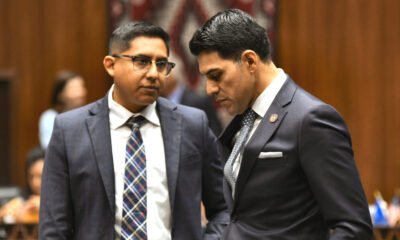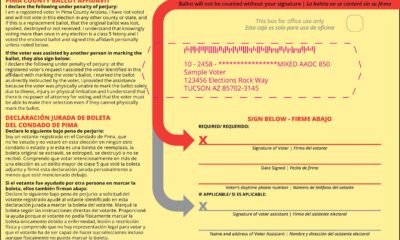Defend Democracy Project
Election Countdown: Rising Fears Over Disinformation and Potential Violence

WASHINGTON — A pro-democracy group issued a warning on Monday about the potential for disinformation and violent rhetoric in the wake of the upcoming election. The remarks from the Defend Democracy Project come as voters prepare to cast their ballots, with final voting concluding on Nov. 5. Given the narrow margins in key races, it’s possible that the nation may not know the outcomes of the presidential and congressional contests for several days.
As election workers begin counting mail-in ballots, speculation may thrive, paralleling the uncertainty of the previous election cycle. Olivia Troye, a former adviser to Vice President Mike Pence, expressed concerns about the consequences of misinformation post-election. She suggested that former President Donald Trump could spread unfounded claims of election fraud if he loses, echoing the violence witnessed during the Capitol riots of January 6, 2021.
Troye mentioned an advisory from the FBI and the Department of Homeland Security indicating that various individuals, including election workers and judges, might be at risk of violence after the ballots are counted. She pointed out recent incidents of aggression at polling places, including reports of ballots being set ablaze in states like Oregon and Washington.
Michael Podhorzer, chair of the Defend Democracy Project, highlighted the complexity faced by state officials in the days following the last presidential election. He noted that with President Biden’s cushion of electoral votes, there was no single official who could alter the election results, unlike the situation in Florida in 2000. However, if the Democratic ticket led by Kamala Harris wins narrowly, the dynamics could shift significantly.
A recent Associated Press-NORC Center for Public Affairs Research survey revealed that 86% of registered voters believe the losing candidate should accept the results of the election. Despite this, only 33% predict Trump would concede if he fails to secure the presidency. In contrast, 77% of respondents expect Harris to accept the outcome if defeated.
Concerns about post-election violence are prevalent, with 76% of surveyed voters expressing high levels of worry regarding attempts to overturn election results. Additionally, 82% reported fears of heightened political violence aimed at officials and figures. Foreign interference remains a significant concern, with 78% of voters anxious about its influence on public perceptions of candidates.
The co-chairs of Issue One’s National Council on Election Integrity condemned a fabricated video circulating about Pennsylvania ballots, linking it to Russian disinformation. They also criticized a Maryland Republican representative’s comments suggesting North Carolina unilaterally allocate its Electoral College votes to Trump. They cautioned that fostering division and false information can undermine democratic processes.
In a separate development at a Trump rally, bipartisan backlash arose over derogatory remarks made by comedian Tony Hinchcliffe about Puerto Rico. Congressional Hispanic Caucus Chair Nanette Diaz Barragán condemned the comments as shameful and dangerous, while Vice President Harris noted such rhetoric contributes to prevailing voter fatigue regarding Trump’s divisive language.
Florida Republican Senator Rick Scott and Representative Carlos A. Giménez also denounced Hinchcliffe’s comments, emphasizing their respect for Puerto Rican culture and identity. Jenniffer González-Colón, Puerto Rico’s delegate to Congress, labeled the remarks as “despicable” and not reflective of Republican values.


















